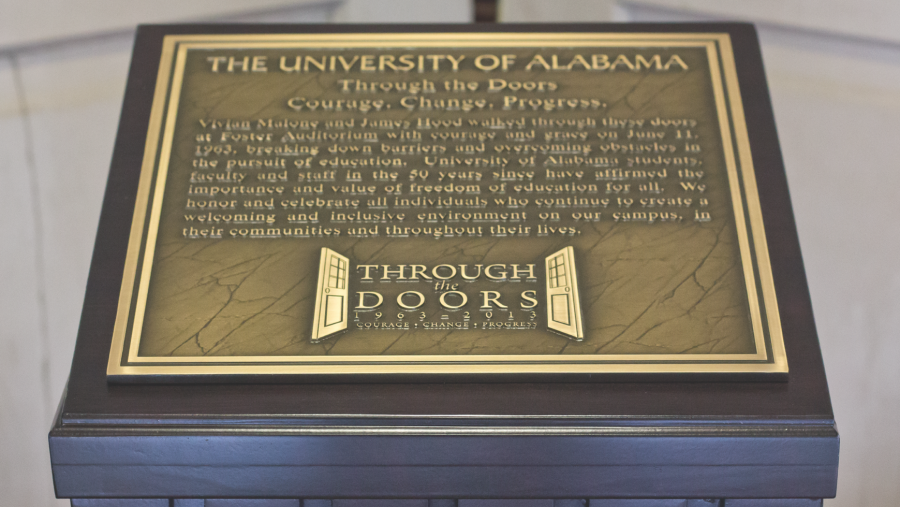Throughout 2013, The University of Alabama’s Through the Doors program will celebrate the 50th anniversary of the desegregation of the University and remember the opposition faced by early black students. This opposition was epitomized by the infamous “Stand in the Schoolhouse Door” speech made by Gov. George C. Wallace in 1963 to prevent the enrollment of Vivian J. Malone and James A. Hood.
The College of Community and Health Sciences hosted “Through These Doors: Changing the Face of Medicine” Tuesday, a discussion about increasing the presence of members of underserved minority groups in health professions.
Dr. Herbert Stone, a panelist at the event, said commemorating the University’s desegregation is important because it motivates those in power to take further action to increase racial equality.
“Realizing what the historical perspective is can bring people closer,” Stone said. “I think it causes people who have some position of influence to redouble those efforts to ensure that everybody gets a seat at the table.”
Stone said increasing the presence of minority groups in health professions can also be a way of increasing access in underserved communities.
One of his colleagues from an underserved area, for example, received medical training in order to help his community.
“He wanted to grow up, get a medical education and go home. His home is one of those areas that is underserved, so they have no [representation],” Stone said. “You’re more likely to work more diligently on behalf of those folks that you know.”
Dr. Sandral Hullett, who served as the Chief Executive Officer and Medical Director at Cooper Green-Mercy Hospital in Birmingham, Ala., said increasing the presence of underrepresented groups in health professions is good for patients who are members of minority groups because these physicians can more readily understand the cultural context of their patients.
“I personally think that if you can relate to people, you probably can get a better working relationship with them,” she said. “People feel more comfortable relating to people who look something similar to them, understand the way they speak or the way they live.”
Stone said early encouragement was a large part of the reason he went into medicine.
“My [mother] gave me a stethoscope when I was in the seventh grade,” Stone said. “I didn’t really know what it was. She didn’t really say much about it, but every doctor’s office you’d go to, there was that ubiquitous stethoscope.”
Hullett said it is crucial when mentoring young people to emphasize the importance of investing in years of medical education when other fields might pay larger salaries more quickly.
“People who are of the same ethnicity can encourage people,” she said. “When you have mentors, when you’re going to people of the same ethnic group, kids feel good about them and decide ‘maybe I want to be a doctor, too.’ [When kids are mentored], they realize that there’s something good about this, that [medicine] is a good thing.”
The Through the Doors program will also include an interfaith prayer breakfast Friday at 7:30 a.m., which will bring together members of various faiths to celebrate the role of faith communities in the civil rights movement.
“Following commendations to Canterbury Episcopal Chapel and First African Baptist Church for their helpful roles in the events of 1963, the program will include performances by UA’s Afro-American Gospel Choir and a brief oral history of the local civil rights movement, along with prayers and music,” said Christopher Spencer, director of community development at The University of Alabama’s Center for Community-Based Partnerships.
Spencer said remembering the past is important to the ongoing effort to support racial equality on campus.
“A variety of programs, seminars, speakers and other activities sponsored by the colleges, divisions and organizations … emphasize the need for the campus community to continue to make a difference in their communities and throughout their lives, and to build a campus environment that welcomes inclusiveness, ensures acceptance and supports the opportunity for every member of the UA family to become his/her highest and best self,” Spencer said.









